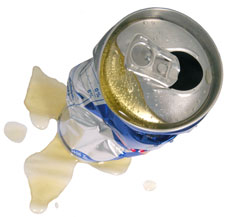Caffeine dependence proves unhealthy

Online Poster
Nov 29, 2004
Last updated on May 11, 2016 at 05:27 p.m.
Laura Brown, freshman in LAS, was taking 400-800 milligrams of caffeine daily in high school. She said she was addicted to caffeine. Now, she takes half that amount per day.
“I don’t depend on it anymore,” she said. “I have fought the addiction for the most part.”
However, with students stressed from classes, midterms and outside activities, high-caffeine products are becoming more popular.
Some students survive every day on caffeine from coffee, Red Bull and quick pick-me-ups, such as caffeine pills. Jared Blackstone, an employee at the Illini Union’s Espresso Royale Caf‚, said a number of people depend on coffee to get them through the day.
Get The Daily Illini in your inbox!
“From what people say, they really need it,” he said. “They ask how much (the caffeine in the drinks) will do for them.”
Blackstone said business increases at Espresso Royale around midterms and finals.
These stimulants are staples in many caf‚s and convenience stores. In particular, the Red Bull energy drink has recently risen in popularity among students.
Although Kyle Claypool, freshman in engineering, said he doesn’t drink Red Bull, he said he knows it has become increasingly popular.
“I know a lot of people who have Red Bull on stock for late-night study sessions,” he said.
Patrice Radden, director of corporate communications for Red Bull, said fatigue, physical exertion and lack of sleep all take a toll on one’s body.
“Red Bull gives you energy and vitalizes the mind, improving concentration and reaction time,” she said.
However, Red Bull is full of caffeine. One 8.3-ounce can contains more than two times the amount of caffeine in a 12-ounce can of soda and about as much caffeine as an 8-ounce cup of coffee.
Lynn McClellan, a registered nurse at the Pavilion, a local psychiatric and drug treatment center, associated three major disorders with caffeine over-consumption: caffeine intoxication, caffeine-induced anxiety disorder and caffeine-induced sleep disorder. Symptoms include racing and/or irregular heartbeat with as little as 100 mg a day, depending on the person, she said. Caffeine can also cause high blood pressure.
Manufacturers recognize that moderate use is important.
“Red Bull is a functional drink and not a thirst quencher,” Radden said. “College students (should only) use Red Bull while studying, on long road trips and in sports.”
Jeff Bellisario, sophomore in business, said students who are involved in campus clubs or who hold jobs seem more stressed and are more likely to use these products.
“It’s more common among students who are overwhelmed and are involved in a lot of stuff,” Bellisario said.
James Ellis, chairman of emergency medicine at Provena Covenant Hospital, said caffeine can be addictive.
“The addiction (to caffeine) is psychological. However, rebound headaches from caffeine withdrawal are common,” Ellis said. These headaches can lead to what some would consider a physical addiction, he said.
Ellis said caffeine can cause restlessness, tremors and seizures.
He said a student was recently admitted to Provena’s ER after experiencing a seizure.
“This seizure occurred from a combination of a lot of caffeine (from Red Bull drinks), very little sleep and a bad diet,” Ellis said.
Ellis prescribed other alternatives to caffeine products even though he said they “are the ones students aren’t going to want to hear.
“Rest and diet are the two big things in terms of study habits,” he said.





